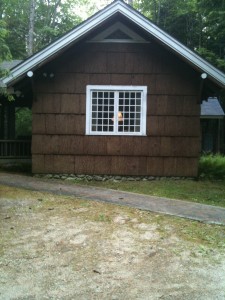 When I wrote the following pages, or rather the bulk of them, I lived alone, in the woods, a mile from any neighbor, in a house which I had built myself, on the shore of Walden Pond, in Concord, Massachusetts, and earned my living by the labor of my hands only. I lived there two years and two months. At present I am a sojourner in civilized life again.
When I wrote the following pages, or rather the bulk of them, I lived alone, in the woods, a mile from any neighbor, in a house which I had built myself, on the shore of Walden Pond, in Concord, Massachusetts, and earned my living by the labor of my hands only. I lived there two years and two months. At present I am a sojourner in civilized life again.
So begins Thoreau’s Walden. I had such a cabin myself for five weeks one summer, my own writing studio deep in the forest primeval, amidst the murmuring pines and the hemlocks. It was here, after an extended period of paralysis—the eighteen months since my husband had died—that I was at last able to earn my living, so to speak, to find once again my justification for existing, which for me had always been writing.
The cabin was in an artists’ colony where I had a fellowship, and here all the mundane chores of life were taken care of. I had applied the previous winter, not believing I would be chosen, but in desperate straits and trying to survive. For my entire life up to the moment of my husband’s death, I had been a writer, but when a stranger called to tell me my beloved was gone, the thought that had immediately entered my head was now I will never write again.
Was this was simply a fact on the ground now, since my husband’s death had turned the world topsy-turvy? Had my reason for writing died with my husband? Since we had met, had I been writing solely for him, for his amusement and delectation, continuously to charm him? That I should sacrifice my writing on his funeral pyre seemed to me what was now demanded. I had been stricken, so now it was incumbent upon me to make a sacrifice to the God of Death.
What else had I to give up? My children were off the table. I had only this left, to bring as an offering, this sacred activity, most precious to me. By the time these thoughts had run through my head, my fingers had frozen.
But writing had always been my way of being and knowing. Now, without writing, I knew nothing. For eighteen months I had no way to process my experience, and it sat in me like a lump, undigested.
But someone had believed in my writing enough to grant me this fellowship, and perhaps that is what finally gave me the courage I had been lacking this year and a half, so when I went to that cabin in the woods I went deliberately, hoping to break the spell and annul the vow. And so, though I had been weeping steadily for eighteen months, when I walked into my cabin, the tears retreated back inside my head, and I began to write.
Words poured from me now like those tears had, breaking the spell I had been under and annulling the vow, and for five weeks, I wrote nine hours a day, seven days a week, happily alone, spending most of my waking hours in the dream of the story pouring out of me and building my story with the labor of my hands only.
Each night, however, I joined with the other artists at dinner, and one night, I said to a woman I had just met, “This is unbelievable. This is art all day, every day!“ She was a fiction writer like me.
“But it’s not life,” I added, because I was somewhat concerned about this.
Now that my husband was dead, I had been wondering if my life, for all intents and purposes, wasn’t over also. By “life” I meant, actually experiencing something instead of merely imagining things all day, writing my story alone in my cabin. By “life” I meant, having intimate human relationships instead of superficial, if pleasant, interactions with acquaintances like her and the other artists in residence.
“No, you’re wrong,” the woman I had spoken to, responded. “This is life. Not the other.”
That was several years ago, when I dipped into eternity each day in that cabin during those five weeks, but now I find myself a sojourner in civilized life once again.